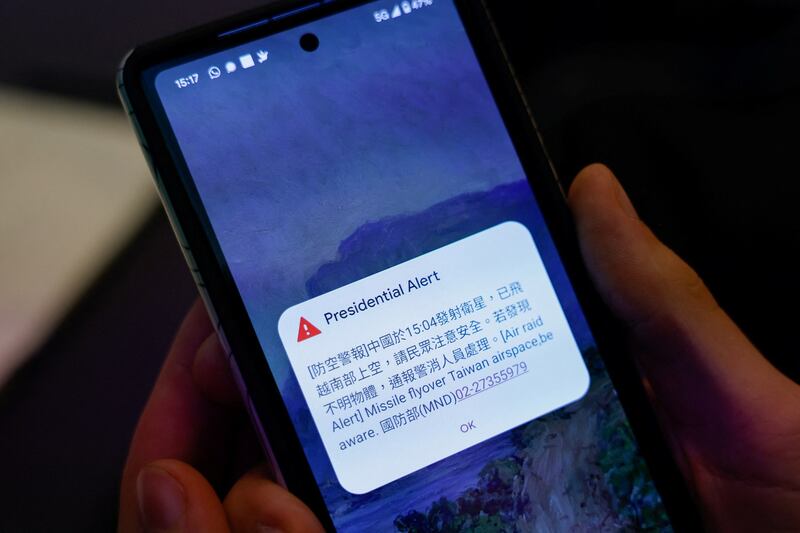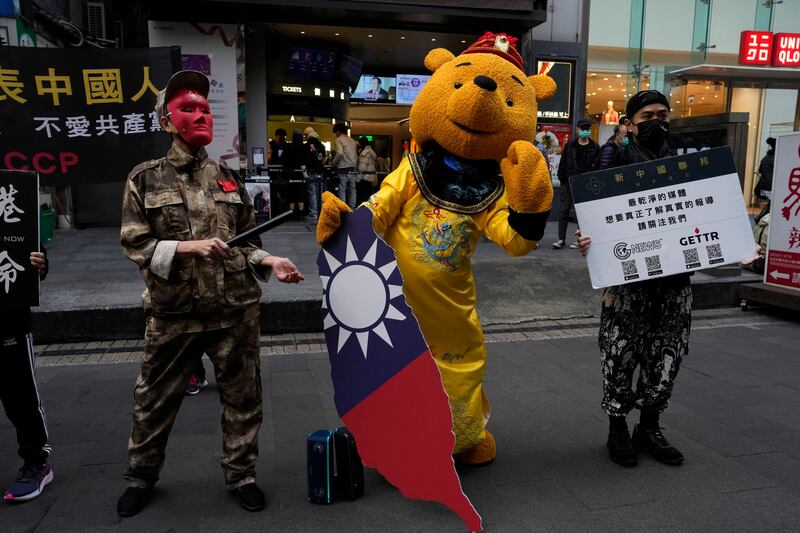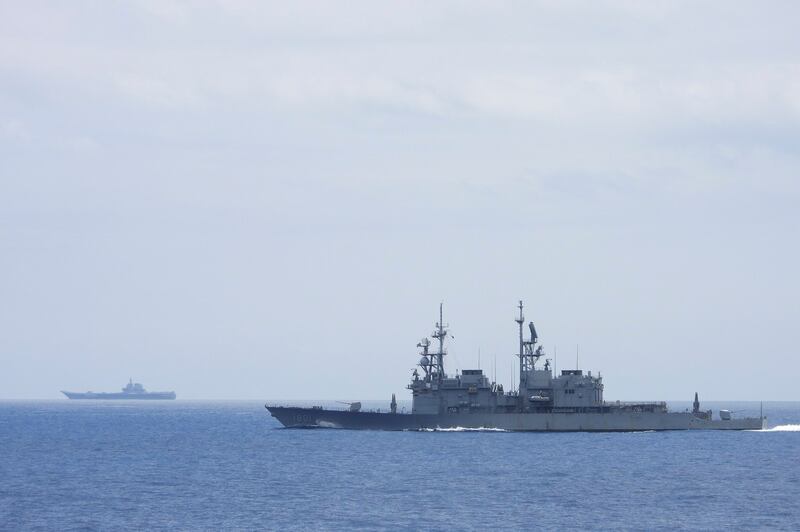On Tuesday, Jan. 9 at around 3 p.m., everybody in Taiwan received a presidential alert via text message, warning them about an imminent satellite launch by China. The text in English, however, reads “Missile flyover Taiwan airspace, be aware.”
After initial confusion, the defense ministry in Taipei corrected the message, saying the English language text was erroneous - it was in fact a satellite that flew over Taiwan's southwest air defense identification zone - and duly apologized.
Ruling Democratic Progressive Party (DPP) presidential candidate Lai Ching-te told local media that the alert was sent because "people have the right to know."
“If any wreckage is discovered then it could be handed over to the relevant authorities,” Lai said.
The main opposition party Kuomintang (KMT) didn’t miss the chance to slam the DPP, saying that when U.S. House Speaker Nancy Pelosi visited Taiwan in 2022, China fired real missiles over Taipei and the DPP government “didn’t sound the alarm.”
"Three days before presidential election, DPP government sends multiple missile alerts," it wrote on the social platform X.
The KMT questioned whether it was misinformation or a DPP campaign strategy and said that national security matters “should be immune from political campaigns.”
The Taiwan People’s Party (TPP) for its part suggested that a China-Taiwan communication line could be established to deal with such emergencies.

The reactions from all three parties “were representative of their national security stance,” according to political analyst Yang Kuang-shun, co-founder of U.S.-Taiwan Watch, a think tank.
The DPP wants “to raise the awareness among the public about the military threat from China and the need for better preparedness,” said Yang, a researcher at the Taiwan Information Environment Research Center (IORG).
The KMT “tends to tone down the severity of Chinese interference in this election” but blame the DPP’s ulterior motives.
“The TPP criticizes both China and the DPP administration… [and] emphasizes the importance of building [a] cross-strait dialogue mechanism for future de-escalation,” Yang said.
“However, I believe that all three parties, not just Lai and the DPP, support enhancing Taiwan's deterrence capabilities and seeking dialogue with Beijing at platform level,” the analyst told Radio Free Asia.
Continuation of Tsai’s policies
On Jan. 13 Taiwanese voters will go to polls to elect a new president and legislature. The election is seen as vital for the relations between Taiwan and mainland China.
“All three parties start on some premise of deterrence and dialogue,” said Ian Chong, a political scientist from the National University of Singapore (NUS) who is currently in Taiwan to observe the election.
“This is in some way a continuation of the Tsai Ing-wen administration’s policies,” he said.
According to Chong, the DPP “sees deterrence as a premise for stable ties and mutually respectful dialogue over practical cooperation to maintain the status quo.”
“These are to be accompanied by efforts to further diversify Taiwan's economy so it is less dependent on the PRC,” he said, referring to China by its official name the People’s Republic of China.
The KMT’s approach, on the other hand, “bets on getting the Chinese Communist Party to commit to restraint.”
“At the same time, the KMT also seeks greater economic integration with the PRC believing that this can lead to peace and prosperity,” Chong said, adding “The example of Russia shows that economic ties are little impediment to the use of force once there is political will to sacrifice those economic interests for other considerations.”
Among the three main parties, in his opinion, the TPP “has the least clear position” as it tries to “play the middle between the KMT and DPP.”
“The TPP also has the least experience with security and external relations,” the Singapore-based analyst said.
TPP presidential candidate, former Taipei mayor Ko Wen-je, in one of his speeches on defense policy, criticized the DPP for "seeking war" and the KMT for "fearing war".

Both the TPP and KMT paint the ruling DPP as “provocative” when it comes to cross-strait relations.
The KMT's candidate, mayor of New Taipei City and former leader of Taiwan's national police force Hou Yu-ih, described the 2024 election as a choice between war and peace and promoted a three-D strategy - Deterrence, Dialogue and De-escalation.
However, some questioned the KMT’s capability of preserving peace and avoiding war.
“One aspect not many people have touched upon this time is the team each party can assemble for its potential governance after being elected,” said U.S.-Taiwan Watch's Yang Kuang-shun.
“KMT's voter base and talent pool are aging after eight years out of power and unpopularity among the younger generation,” he said, “It may lack the talents needed for international outreach.”
The China factor
Ian Chong from the NUS told RFA he found it “curious, that the Chinese Communist Party is echoing the KMT line about DPP provocation.”
“I don't think the DPP is particularly provocative,” Chong said, “Beijing echoing the KMT is also a function of them not having a better policy of dealing with the Tsai administration and the DPP.”

There are conflicting assessments of the possibility of an armed conflict in the Taiwan Strait, with many different timelines being proposed by watchers and analysts.
Ian Chong said that China’s pressure on Taiwan “will continue regardless of which party wins the election, but the modality may change.’
“The DPP is likely to invite more intimidation, the KMT and TPP being in office will probably see Beijing trying to force them to take positions that make Taiwan dependent on the PRC,” Chong said.
“Ultimately, all the parties will have to respect the fact that more than 80% of Taiwan's population want to maintain the status quo whatever their aspirations are,” he added, “They will punish parties for veering too far in any direction.”
Edited by Mike Firn and Taejun Kang.
